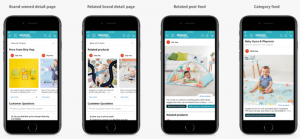Blogging is an effective marketing tool that is sadly underutilized by some businesses. Unfortunately, e-commerce websites fail to see the value of a blog and see it as a distraction.
Understandably, churning consistent quality content may be outside their field of expertise. And populating your website with low-quality content is the worse strategy. You will only lose yourself in the ocean of words that are published daily. For example, on WordPress alone, there are 2.3 million blog posts each day.
While blogging is not a requirement for a successful website, it can go a long way to establish your credibility, generate new traffic, and promote your products and services. Previously, we’ve shared strategies for success with copywriting and social selling and tips for writing captivating blog posts.

pixelcreatures / Pixabay
Today, we want to share some specific tips you can follow to increase the conversion rate of each blog post:
- One post, one goal — You blog with one goal in mind so that you would be all over the place. As a result, you will not confuse your readers regarding your objectives. Meet with your team to determine your goals using the S.M.A.R.T. or C.L.E.A.R. method. From your main goal, you can create sub-goals within the blog but make sure you do not veer away from your primary objective.
- Identify your audience — Knowing your audience will determine the language you are going to use. In marketing parlance, mirroring is a method to mimic the prospect’s movements to make yourself more accessible. You can get your message across more clearly if you speak your target reader’s language.
- Find your voice — How would you like your audience to know you? You can leave an impression by the tone of your blog content. Finding your voice means establishing your corporate identity. Would you like to sound casual, the way you speak to your family and friends? Would you like to appear professional, as you would treat your colleagues? You can be humorous, witty, optimistic, informal, or be serious. But always strive for authenticity because the audience will sense fakeness.
- Write eye-catching headlines — It takes a reader less than five seconds to decide whether to continue reading your post or not. And it all starts with the headline that grabs their attention and stirs their curiosity. Your headline must be witty, provide a solution, and be optimized for SEO. How many words should your headline have? The numbers vary but make sure they do not exceed ten words. The Advanced Marketing Institute released a handy tool to gauge the Emotional Marketing Value of your headline.
- Solve a problem — The blog post should not exist in a vacuum, meaning you do not write simply to meet your daily quota. The content is geared to the search intent. Customers go online to find a solution–whether buying a product or answering their nagging questions. But try to provide a solution that will resonate with the reader’s emotions. If they can relate to your post, they tend to make an affirmative action
- Optimized for SEO — No matter how well your write, it would not matter if you cannot reach your intended audience. Search engine optimization will get you there. Using SEO best practices, you will put yourself in a better position on the search engine results pages. As the numbers show, people typically find their answers within the first five websites on Google’s SERP. For example, the top website on Google’s search results will corner 33% of the total traffic
- Update consistently — What does consistently mean? The frequency of your blog post depends on your business. A smaller company can get away with posting a blog 3-4 times a week, but websites with a large following tend to post daily. The magic number seems to be 11 or more per month. Hubspot placed the number at 16 or more as websites generated 3.5 times traffic as a result. Consistency also refers to the days of the week that you post. You can also ask your readers to subscribe to your newsletter or RSS feed. In this way, you can alert them every time you post a blog
- Be aware of your time — The time you post your blog on your website is as important as the frequency of uploads. If you are a small business, you may consider hiring content writers who are knowledgeable about SEO. In 2017, Trackmaven (now Skyword) published a report concluding that Sunday is the best time to post a blog since they were shared a lot more. Meanwhile, Tuesday, Wednesday, and Friday performed worse. Another research suggested that the best time to post is between 9-10 a.m. on a weekday. But you can always measure your post to determine which time is best for you.
- Anecdotes and real-life experiences work — A case study that will support your solution or hypothesis will help persuade your audience better. There is a reason why people read reviews before purchasing a product–they want to hear the POV of other consumers and determine the pros and cons. Meanwhile, writing anecdotes not only provides the proof your readers need, but they are also very engaging compared to the average blog post. Again, make sure that you draw the case study from your experience rather than pulling it out of thin air. The readers can sense if you are trying to manipulate them.
- CTA — Lastly, your blog should have a call-to-action to drive home your point to the readers. In this way, your audience would not be confused by your intentions. You can ask them to share your content, try out your product, subscribe to your newsletter, or comment on your blog post. With a compelling CTA, you can encourage your readers to engage with your business.
Conclusion
If you have not yet jumped on the blogging bandwagon, it is not yet too late for your business to do so. But it is a slippery slope, especially if you are not confident about your writing skills. Fortunately, you can outsource your content to pros with the experience and knowledge to deliver results. The benefits you gain from reaching your goals will outweigh the cost.
This article was previously published on SocialSellinator’s blog.
Digital & Social Articles on Business 2 Community
(54)
Report Post







